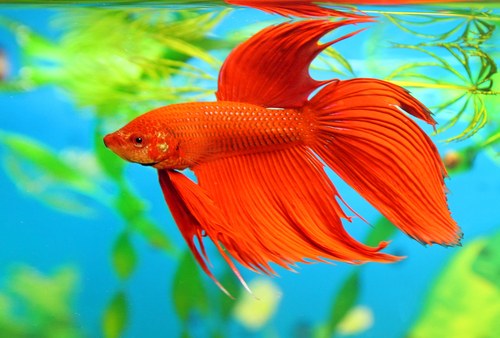
Betta fish make excellent pets for your tank. They are extremely responsive and vibrant colored, which adds to your aquarium’s beauty. They are, however, highly sensitive fish and susceptible to several health issues. Simple issues like poor water conditions, stress, overfeeding, and water temperature can be causes of betta fish death.
Because betta fish are expressive creatures, a few tell-tale betta fish behaviors before death can be observed. Identifying these signs early can help you save your betta. Take a look at these common indicators.
10 Common Signs And Symptoms Of Betta Fish Behavior Before Death
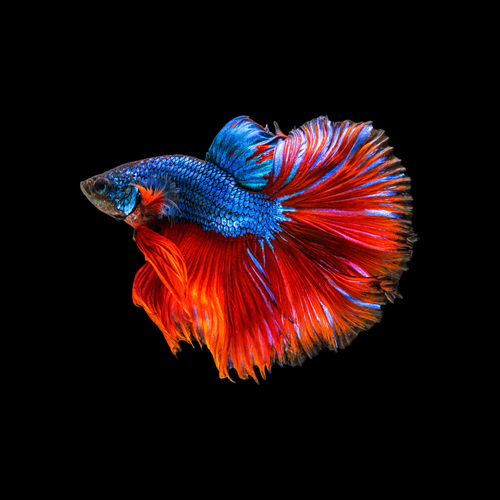
1. Lethargy
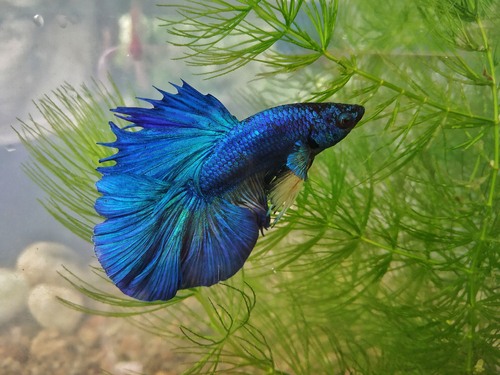
Before death, lethargy is an expected betta fish behavior. Suppose your betta suddenly appears to have lost interest in everything and appears sleepy and tired. In that case, this is an indication that its body is gradually shutting down and death is imminent.
Betta fish are typically active and responsive fish that react to noise or when you approach the tank. However, sudden inactivity can indicate that your betta fish may be unwell.
However, not all signs of lethargy mean that your precious pet is about to die. Lethargy is also a typical symptom of many fully treatable illnesses. They also exhibit this symptom if the water quality is poor or they are stressed. But if your betta is old, this could just be a sign that their body is deteriorating further. You should always seek advice from a betta fish vet if unsure.
2. Loss Of Appetite
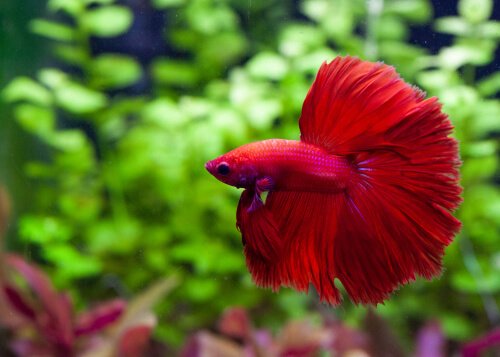
Loss of appetite is another recognizable sign of betta fish behavior before death. Your aquatic friend refusing to eat or not fetching food from the tank surface could be cause for concern.
You may also need to take your fish’s age into consideration. If your betta fish is younger and losing appetite, have a vet examine it. Your betta fish could be fighting an infection or other condition that could lead to sudden betta fish death. For older fish, loss of appetite can indicate slowing metabolic functions. Because they move around less, they require less energy and tend to eat less too.
Just like any dying organism, a betta fish will have no desire to eat as it approaches its end. If the illness has been treated and you see no improvement, it is a good idea to keep feeding your fish. You never know if it could have a miraculous recovery, and the last thing you want is for it to starve to death.
3. Reduced Movement Or Swimming
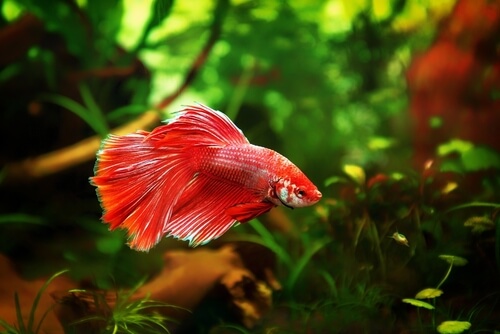
Not moving is unusual for betta fish. Bettas are extremely sensitive to their surroundings and will frequently swim delightedly when you pass by their tank. It can be concerning to notice that your once enthusiastic fish is no longer moving. This is one of the few signs that your fish is close to death or seriously ill.
It’s not just the lack of movement that should be concerning, but any strange swimming patterns are also a concern. Swimming patterns to look out for are swimming and floating close to the water surface, swimming in circles, banging into the tank or other objects, and swimming upside down.
Besides death, other conditions such as swim bladder disease, parasite attacks, lack of oxygen, poor nutrition, poor water quality, and poor vision could be the reason for your betta’s limited movement.
4. Sticking To The Bottom Of The Tank
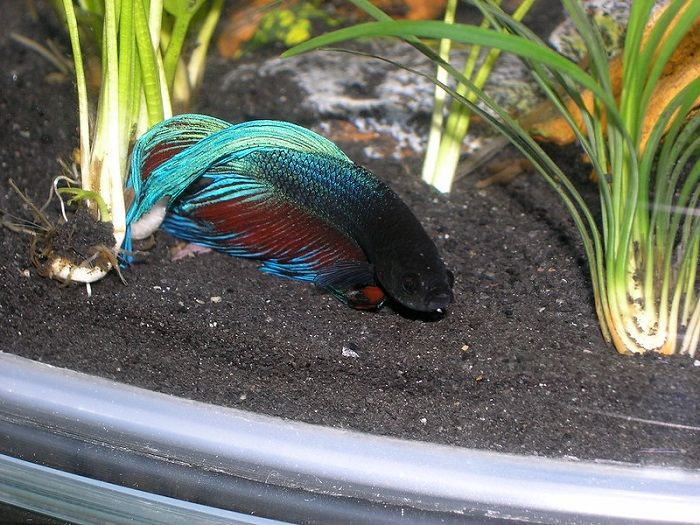
Betta fish usually rest by lying down at the bottom of a tank. You are likely to find them at the bottom more regularly due to lethargy in old age. However, you should be concerned if you notice such behavior for two to three days during the day.
When bettas have contracted a disease, they will be less active. So, if you find your fish lying horizontally, he could be displaying a typical betta fish behavior before death. If it’s due to disease or old age, your betta won’t live much longer.
If the cause is poor water quality, your betta has a chance of surviving. The necessary steps need to be taken to improve water quality. Check the filter on the tank as well. A filter is essential for removing ammonia and chemicals that accumulate if the filter stops working.
5. Loss Of Color
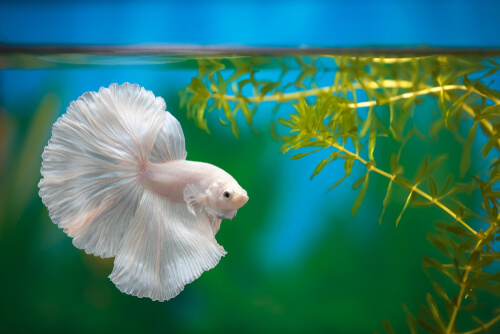
Betta fish’s color will naturally fade as they age. This is a slow and expected process. But if your betta is still young and you notice your betta’s color fading quickly, this could be a sign of illness or impending death. Abnormal white patches on the body of your betta are also cause for concern.
Betta fish are bright-colored attractive fish that many enjoy admiring. When their skin color fades due to age, their skin becomes transparent, revealing their internal organs. In younger bettas, skin or scales discoloration can be caused by unfavorable water quality, infections, insufficient oxygen levels, or poor diet.
6. Rapid Breathing
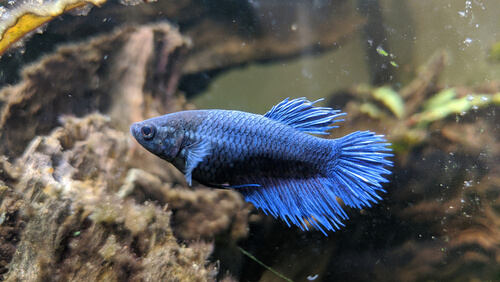
Bettas have gills that allow them to breathe and absorb oxygen from the water. These fish have trouble breathing when they are old, sick, or in poor water quality.
You may notice your colorful pets gulping for air or gasping at the water’s surface. That could be because the bettas’ gills aren’t working properly or the oxygen level in the tank is insufficient.
A betta’s ability to obtain a large volume of oxygen diminishes with age. And this results in the fish breathing more rapidly. As they await death, you will notice older bettas gulping or gasping for air.
7. Isolating
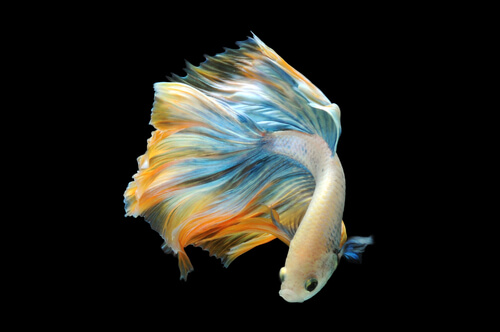
Unlike other fish species kept in tanks, bettas are friendly with other tank mates, aren’t overly aggressive, and are generally not territorial. Suppose your aquatic friend, who is typically very responsive to you and other fish in the tank, suddenly withdraws. This could be a sign of sickness or a normal betta fish behavior before death.
In the wild, an old betta fish will hide under stones, plants, and rocks. They behave similarly to how they do in the wild in tanks. They hide under plants and tank objects to avoid engaging with tank mates.
If you notice this sudden change in your betta’s behavior, you should worry as your betta could be ill or dying. Stress and appetite loss are other underlying causes for your betta isolating themselves from other tank mates.
8. Stress
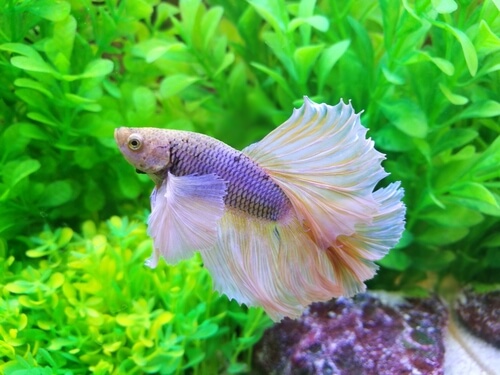
In older bettas, poor water parameters cause severe stress and anguish, resulting in death due to a loss of senses. Bettas may experience anxiety due to a surge in toxic gasses such as nitrates and ammonia in the tank.
The increase in toxicants causes damage to the betta’s neural system resulting in loss of hearing and smell, which makes them less responsive. Changing environmental conditions, a poor diet, glass tapping, overcrowding, frequent water changes, bullying, and diseases are additional sources of stress.
Stress is the leading cause of betta fish health problems because it weakens their immune systems, exposing them to various illnesses.
9. Swollen Eyes
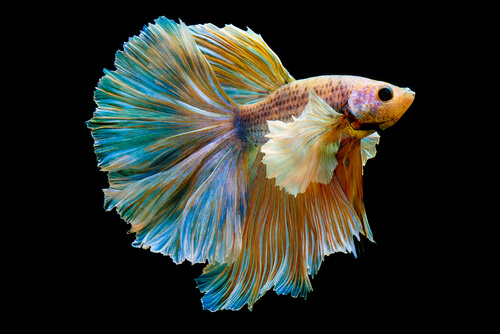
When a betta fish’s eyes swell, it indicates that it is in distress, and this is a typical betta fish behavior before death. Betta fish are susceptible to infections and inflammation, which can lead to eye problems. When the eye of a betta fish swells, it is due to a severe viral or bacterial infection.
A variety of factors, including overcrowding, a lack of oxygen, or stress, can also be associated with this type of reaction from your fish’s body. It can be challenging to tell if the outer layer of the betta’s eyes is swollen, but it will be visible if you look closely.
Usually, when a betta fish has a swollen eye, it indicates that they have already been ill for a long time. Betta fish struggle to recover from a viral or bacterial infection that has progressed too far and will likely die.
10. Hunched Back
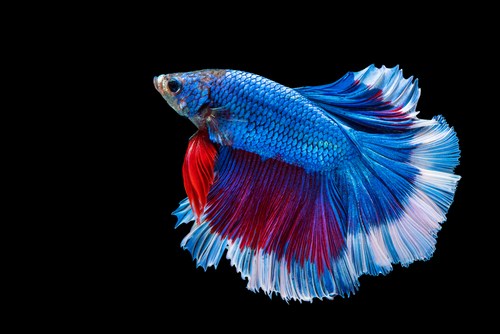
If your betta is getting old, it will often develop a hunched back, which is a tell-tale sign that it is nearing the end of its life. A hunchback usually develops gradually as bettas get older. This does not necessarily indicate that your betta fish will die immediately, but it is an expected senior betta fish behavior before death.
Another reason for your betta’s hunchback could be fish TB. If your pet’s spine is beginning to curve, it’s either because the organs are now pretty damaged that they’ve begun to swell, bending the spine’s shape, or the spine has become infected. TB infections are fatal to your fish.
How Do Betta Fish Look When They Die?
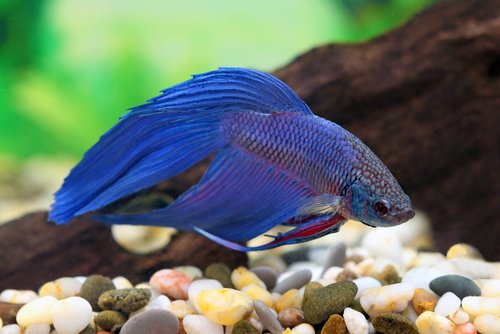
If you’re not a seasoned betta fish owner, you may not be able to tell if your fish is dead or not.
Here are a few helpful clues to assist you in identifying if it is dead:
- You will see no movement of the gills.
- The eyes will be sunken in with cloudy pupils.
- The fish might be floating lifelessly on its side or belly up.
- The mouth stops moving.
- Their skin becomes solid and dry.
What Are Treatable Betta Conditions?
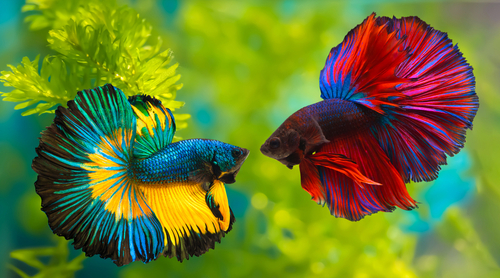
Betta fish contract infections and diseases quite easily. Not every disease they contract is deadly to your aquatic friend if caught early. These are a few treatable conditions:
1. Fin And Tail Rot
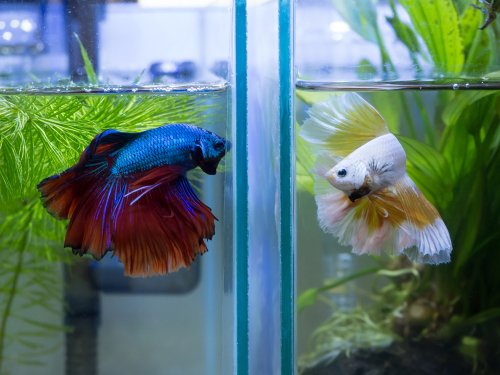
The most common betta fish disease is fin rot or tail rot (melt). Fin and tail rot is a betta bacterial infection of the fins that eats away at them. This can be easily mistaken as tail biting at first. The disease will be visible with symptoms such as red or black bruises along the affected areas that can be bloody.
This condition of fin rot is usually caused by poor water conditions, which stress the fish and reduce their immune system’s ability to fight disease. If the infection is not treated, it will spread throughout the betta’s body and eventually lead to the death of these aquatic creatures. The fin rot treatment consists of a complete water change and tetracycline administration for the fish.
2. Ich
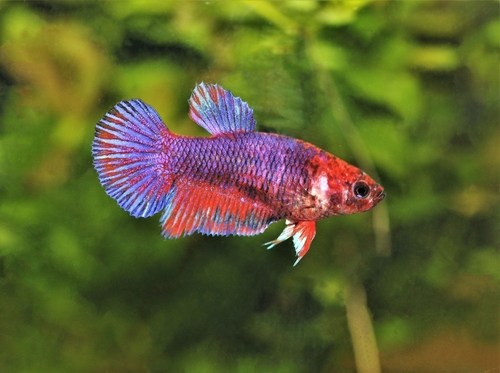
Ich is distinguished by small white dots that are actually small cysts containing a parasite. These spots are visible to the naked eye and appear on a betta fish’s body and fins. These cysts contain the parasites’ immature stage, known as tomites.
Left unattended, these parasites slowly eat away at the betta’s body leading to its inevitable death. If you notice your betta fish rubbing up against objects and looking uncomfortable, it may have Ich.
Ich can only be treated in the free-swimming stage, so remove your carbon filter, add malachite green to the tank water, and raise the tank’s temperature to 85 degrees Fahrenheit.
3. Swim Bladder Disease
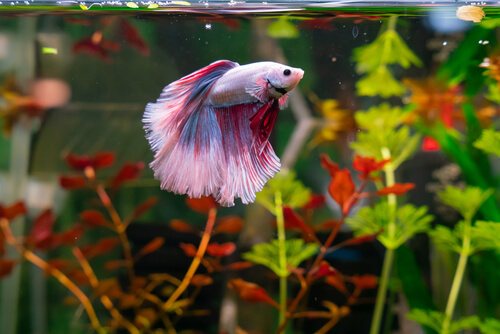
A swim bladder is an internal gas-filled organ that helps bony fish maintain buoyancy. Swim bladder disorder is a condition in which the swim bladder does not work correctly as a result of disease, stress, overeating, or poor water quality.
Swim bladder disease impairs your betta’s swimming ability. You may notice that they have difficulty keeping their balance and swimming on one side, upside down, or both. To correct this, it is essential to identify the cause. If it is overeating, adjust the amount of food the fish is fed. Other steps to remedy the situation should be adjusting water parameters and an antibiotic.
4. Velvet
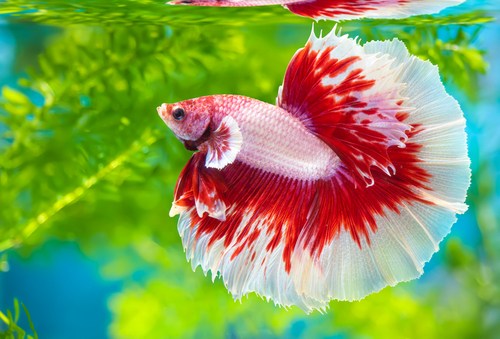
Velvet is a betta fish disease caused by a parasite called Oödinium. It usually presents itself as a rust-colored sprinkling on the betta’s gills, body, fins, or all three. Bettas with velvet will swim around the tank looking for objects to rub themselves on – similar to Ich – attempting to remove the parasites.
This disease is highly contagious to other fish, so the whole tank community needs to be treated for velvet. If left unattended, this could be deadly to all fish. Velvet is usually caused by poor water conditions, stress, and extended exposure to water temperatures colder than tropical. Velvet is difficult to see but should be visible in good lighting.
Final Thoughts
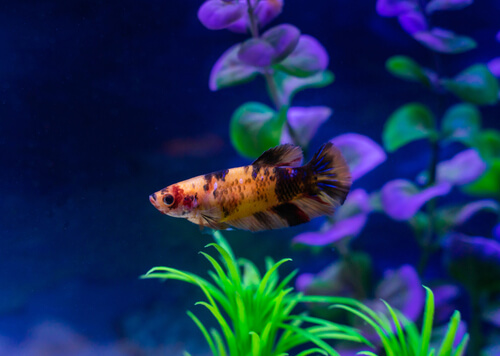
If you find that your betta may have one or more of these symptoms and you are unable to find the cause of this reaction, it is best to visit a betta fish vet. The prolonged lack of reaction could be the reason for whether your fish survives or not.
Before getting a betta is important that you do your research on how to care for them. One innocent mistake in their daily care could possibly harm their health and could lead to inevitable death.




